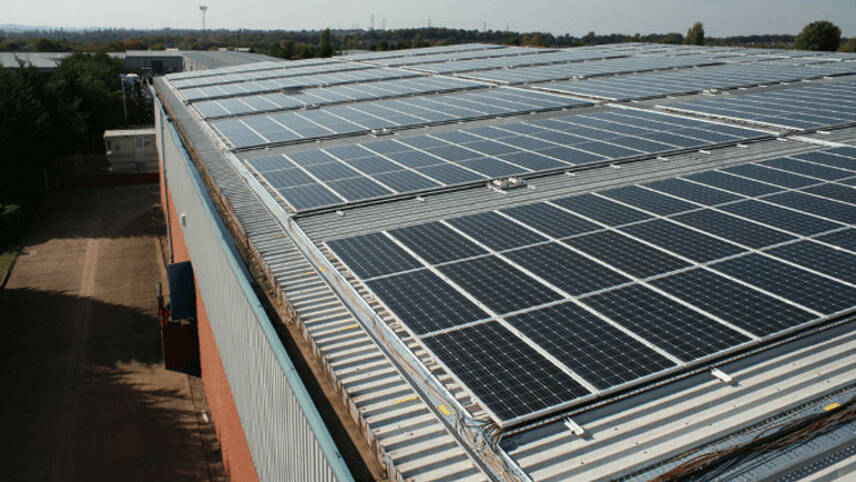This premium content is exclusive to edie Members.
To find out more about edie Membership, please click below.
If you are an existing member, login here

Image: Pager Power
The survey, commissioned by energy developer and service provider BayWa r.e., polled 2,505 decision-makers across the five large industries – food, finance, manufacturing, retail and transport. Participants hailed from the UK, France, Spain, Germany and Italy.
Promisingly, almost 80% of all survey respondents said their organisation has a strategy in place to transition to low-carbon energy. This proportion was slightly higher in the UK, at 84%.
Only 4% of the group as a whole said their business had no such strategy and did not intend to develop one in the near future.
Yet around half of respondents said they were only just getting started on their clean energy journeys.
This is concerning given the extent to which, when working collaboratively, private sector actors can influence the pace of the energy transition by growing supply chains, upskilling workers and swaying policy decisions.
The big three
Across all five of the nations covered by the BayWa r.e. survey, less than 2% of respondents said they had no barriers to delivering their firm’s clean energy objectives.
The biggest barrier to was found to be a lack of green energy supply infrastructure, with the transport sector acutely impacted.
Included in this definition are issues such as complexities navigating the power purchase agreement (PPA) market or a lack of grid capacity making it challenging to connect on-site arrays.
This challenge was perceived to be worse among British firms than their peers in mainland Europe. Some 29% of the UK-based leaders cited this concern as a top-three issue compared to 24% in France.
Solar developers in the UK and businesses with onsite solar alike have told UK MPs in recent months of years-long delays for grid connections, with emergency interventions now being made by the National Grid to fast-track projects as broader policy reforms take shape.
The International Energy Agency (IEA) recently stated that global annual investments in modernising and expanding electricity grids need to at least double.
The second-biggest barrier identified through the survey related to complex regulatory and bureaucratic hurdles, such as convoluted planning processes or outdated subsidies which keep fossil fuel prices lower than clean energy prices.
Linked to this, in third place, was a perception that clean energy solutions are simply too expensive upfront at this point in time. This perception was strongest in Italy and Spain, and slightly less of a concern in the UK.
Despite the decreasing payback periods as clean energy technologies improve and with the gas price crisis in mind, the fact remains that many businesses are struggling to even stay afloat against persistent and compounding economic headwinds. Backruptcy rates for businesses in Europe reached a seven-year high last summer and rates are not expected to decrease until 2025 at the earliest.
Policy direction
Of course, policymakers have a key role to play in addressing all three of these challenges. And with 2024 being an election year for the EU and the UK alike, now could be a time for acceleration and ambition – or for delay and distraction.
When asked which organisations are mainly responsible for the success of the energy transition, more than half of the survey respondents pointed to either national or regional governments or to local authorities. This was compared to 16% who put the responsibility mainly at the feet of the private sector.
Asked to name the biggest issue policymakers need to address in 2024, the respondents cited the need for more ambitious and detailed plans to stop fossil fuels from being baked-in to energy systems for decades to come.
Commenting on the findings, BayWa r.e.’s chief executive Matthias Taft said: “Businesses are ready for the green transition, but bureaucracy and the lacking availability of green energy is standing in their way. This is leaving more than one backdoor open for the fossil fuel industry – on top of the weakened language we saw at COP28. We have to finally slam these shut.”
In the weeks since COP28, it has become clear that some nations continue to read the text as if the need for accelerated action is optional. Saudi Arabia has stated that it felt it was “given priority” in the negotiations and will believes that the issue of an outright end to fossil fuels “has been buried”.
The EU, for its part, staunchly opposed the oil state’s efforts to water down language at COP28, paving the way for oil and gas exporters to go all-in on carbon capture rather than changing their energy generation mix. Opposition was particularly vocal from Germany.
The UK, ahead of COP28, hinted that it would be happy to accept such language in the name of securing a deal during this increasingly politically tense and polarised time in history.
Since COP28 came to a close, the UK’s Conservative-led Government has been pushing forward a Bill that would mandate annual oil and gas licencing rounds to be held for the North Sea. COP26 President Alok Sharma was the Party’s only MP to abstain, stating that the biggest negative impact from the Bill would come not from additional production in the UK but in the mixed messaging sent internationally.
Related feature: Why the benefits of trebling renewables by 2030 outweigh the potential negatives


Please login or Register to leave a comment.